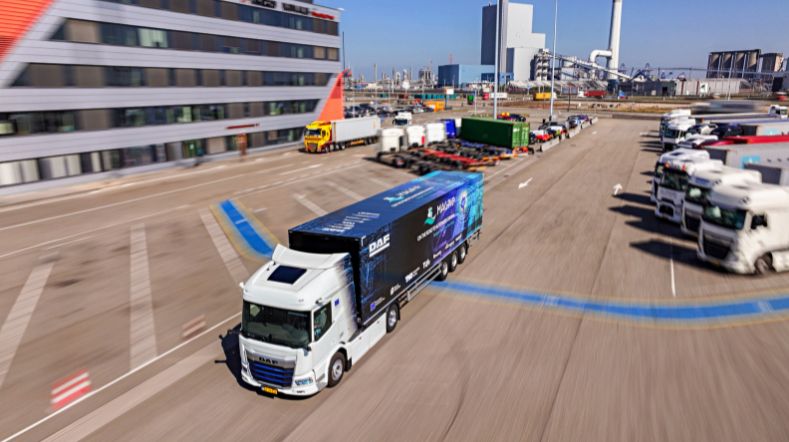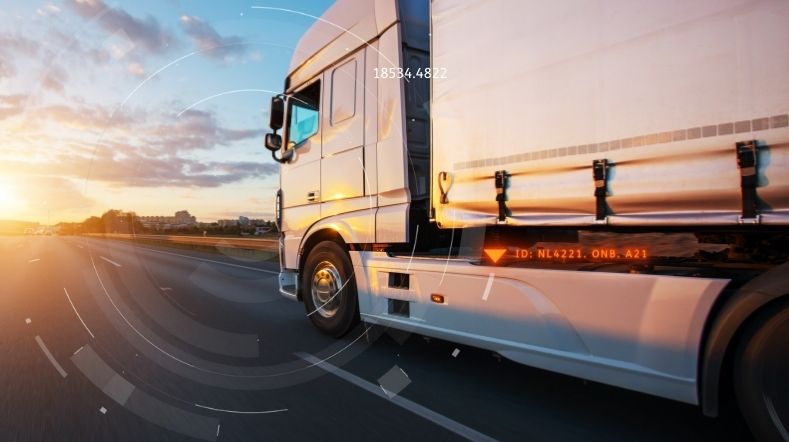
TNO CEYAS offers logistics partners advantage yard automation
During the ICT&Logistics | Logistica Next 2024 trade fair, TNO demonstrated its Cost Efficient Yard Automation Solution (CEYAS). This automation concept is an affordable, scalable, and reliable solution for distribution centres, ports, and other logistics parties facing increasing driver shortages and costs. TNO invites market parties to further develop the promising proof of concept together into a practical, future-proof solution for logistics.
On the inner grounds of the Jaarbeurs in Utrecht, visitors watch the smooth movements of a trailer mover that, fully autonomously and purposefully, moves a trailer along a course. Visitors can select the route themselves, and the technology then follows it flawlessly and completely autonomously.
What visitors see is a modest but convincing first step towards yard automation. The demonstrator of the automated trailer mover is a joint development by TNO with consortium partners Verhagen Leiden and V-tron.
In the tent next to the demo, we speak with Emilia Silvas, Program Manager Safe & Efficient Mobility at TNO and Professor at TU Eindhoven. “Simple is beautiful, and that is exactly the beauty of CEYAS. With this concept, we show that good solutions do not always have to be complex or extremely expensive. This demonstrator consists of an electric trailer mover, the V-Move from Verhagen Leiden, which is normally operated manually, but which we have equipped with modular automated driving software. This enables trailers in yards to carry out common manoeuvres automatically, eliminating the need for drivers. It is just a preview of the extensive application possibilities of low-threshold yard automation for logistics.”
Smarter use of drivers
Yard automation is a theme that the logistics sector cannot ignore for several reasons, Silvas expects. “In the short term, there is a looming driver shortage in the Netherlands and Europe. For repetitive, unpopular driver tasks, such as shunting at distribution centres, it is becoming increasingly difficult to find people. With yard automation, you outsource these boring tasks to technology, allowing you to use drivers more effectively for more challenging work. Moreover, yard automation offers potentially great benefits for the efficiency and reliability of logistics processes. Technology is never sick, does not need sleep, and can endlessly repeat the same actions with great precision and reliability.”
And yard automation gives a new impulse to logistics, Silvas expects. “New functions will emerge, with not only tele-operators but also software developers and technicians. New products and services will also emerge to manage and maintain trailer movers. New disciplines will also be needed for this.”

'With this concept, we show that good solutions do not always have to be complex or extremely expensive.'
The COVID-19 crisis was a wake-up call
But Silvas also sees many long-term benefits of automated logistics processes. “During the COVID-19 pandemic, supply chains were severely disrupted, leading to empty shelves and prolonged delivery problems. This crisis was a significant wake-up call. Since then, we have been moving from traditional, labour-intensive logistics processes to decentralised, automated solutions. Think of smart containers or other innovative concepts. Ultimately, the goal is to make logistics more profitable, robust, and sustainable. The Netherlands has traditionally been strong in this sector, but we must continue to innovate to maintain this lead.”
TNO wants to contribute to this with an integrated vision of future-proof logistics. “We always look at the bigger picture and make optimal use of digital solutions, such as smart data-driven models and even better planning algorithms. One of the projects that will support our new Early Research Programme for Self-Organising Logistics is called ‘Next Level Logistics (that is multi-company talking trucks)’. In this project, we are exploring whether carriers and shippers can jointly achieve more efficient logistics planning by sharing transport capacity. This reduces the number of empty kilometres, resulting in cost and emission reductions.”
Affordable solution missing
Although the benefits of yard automation are widely recognised, there is a lack of affordable, simple solutions.
The demonstrator driving around the Jaarbeurs grounds has been developed over more than two years by the consortium partners. In the control room, Frank Evers closely monitors the movements of the V-move during the demo. Evers has been involved as Technical Lead in the CEYAS concept from the beginning. “The current demonstrator can drive both autonomously and with the help of a tele-operator. This dual operation makes the trailer mover more versatile and cost-effective. This way, we can automate many functions without wasting time and costs on tasks that are still too complex to automate.”
Automatic coupling
In the coming period, the CEYAS partners will further develop the system, focusing on the vehicle’s perception and the coupling process. Frank Evers: “For safety, it is important that the trailer mover is aware of its surroundings and situation. We also want to automate the coupling and uncoupling of the trailer, which happens thousands of times a day in a distribution centre yard.”
However, according to Evers, it is not the intention to develop CEYAS into a ready-to-market product entirely in-house. “We want to bring this solution closer to the market quickly by learning from our partners’ practices. This way, we can better focus on the market’s needs.”
Tech transfer
In addition to further scaling up the proof of concept, TNO is exploring a second route to market. “Through our Tech Transfer programme, we are looking at whether we can turn an internal technology into a new company,” explains Silvas.
This is interesting for several reasons. An important consideration is that many parties dealing with this issue prefer a mature solution that they can take as a service and scale up. That is not TNO’s role by definition: we develop an idea, translate it into a working prototype, and build a proof of concept to demonstrate its viability. Then it is up to the market to bring an innovation to maturity. But if there are not enough companies, such a spin-out can be a good alternative."

'We also want to automate the coupling and uncoupling of the trailer, which happens thousands of times a day in a distribution centre yard.'
‘We need each other’
At the same time, it remains interesting for partners to join the further development of the CEYAS concept at this stage.
Frank Evers: “I hope that some visitors to our demo have realised that they have just seen the solution to their problem. Entrepreneurs who are already struggling with staffing their distribution centre and the reliability of their logistics planning. The pain is already felt, but there is still time to find solutions. Those who invest in automation now will reap the benefits later. To really come up with solutions that benefit logistics, we need each other.”
Emilia Silvas adds: “That’s why we like to think along with our partners. Do you use the trailer mover for a completely different application, requiring various adjustments? We prototype extremely quickly and have a lot of experience with pilots and testing. Even if partners want to have their own solution validated or improved by us, they can come to us. I would say, try us out.”
Get inspired
Demonstrations of automated driving and charging for logistics at Maasvlakte


Getting on board with autonomous transport? Five things you need to know


Close collaboration and learning by doing is the way forward in Connected Automated Transport


Connected Automated Transport: from theory to wheels on the road


Data driven logistics: the future of logistics



